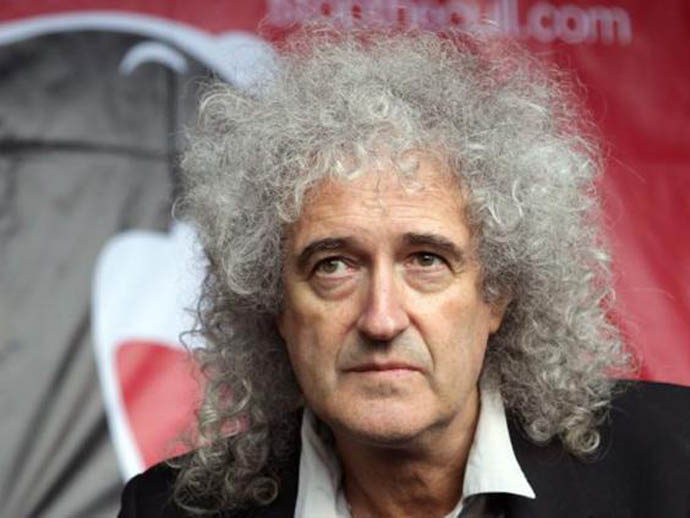INDEPENDENT
3 October 2015 by Cahal Milmo
Exclusive: The 68-year-old rocker has become a founding supporter of a campaign to restrict or ban the building of so-called “mega-basements” by monied homeowners

An example of a ‘mega-basement’, this west London mews house featured in Grand Designs on Channel 4 TV Sarah Lee From badger setts to his studies of the universe, Brian May has long had a fervent interest in black holes of one shape or another. Now the Queen guitarist has added another type of void to his list of passions – those appearing under expensive homes across London and beyond.
The 68-year-old rocker has become a founding supporter of a campaign to restrict or ban the building of so-called “mega-basements” by monied homeowners – robustly described by May as “basement-building bastards” – seeking to expand their houses by digging below ground to add amenities from laundry rooms to swimming pools.
Demand for extra space in the cramped capital and other British cities has resulted in a boom in the creation of “iceberg homes” in select neighbourhoods, with basements often larger than the original property itself.
But along with it has come an epidemic of complaints from those living next to the building sites about noise and disruption, and growing concerns about the safety of the often vast excavations. A company director was jailed in December for manslaughter after a labourer died when a basement project in west London collapsed.
Last year May complained that the corner of the plush borough Kensington and Chelsea where he has an £11m-home had been turned into a “hellhole” during extensive renovations to neighbours’ homes, including the addition of a two-storey basement to house a gym and a garage for five cars.
Now the musician, who is a prominent campaigner on animal rights and a lead voice against the culling of badgers, has added his voice to a wider campaign calling for basement building to be heavily restricted and in some cases banned outright, while comparing expansionist homeowners to delinquent “hoodies”.
May told The Independent on Sunday that his anger at work in his own neighbourhood has been deepened by concern that “anti-social” basement projects are spreading across Britain.

Queen guitarist Brian May has co-founded a campaign to ban homeowners from digging ‘mega-basements He said: “I make no apology for describing these people as basement-building b*******. The problem has become even more serious as builders tout for business and many new buyers embark on three-year projects purely to make money. These selfish people are now a menace to society.”
He added: “Even if what these people are doing is technically lawful, they are destroying decent residential areas. This is a behaviour so anti-social that action clearly now needs to be taken to bring the perpetrators to justice. If hooded young people were causing such destruction of people’s quality of life, they would be behind bars by now.”
May is backing the #BantheBasement campaign, launched by a businessman who believes that the epidemic of digging is ruining the urban landscape and poses too high a risk to construction workers.
Will Davies, founder of property maintenance company Aspect, said he was so worried about poor construction standards in the basement industry that he refuses to let his employees work on sites where they are being built.
He said: “At the very least we need to see consistent rules and standards which severely limit these basements and make them safe for those who create them. The landscape of our cities is being changed radically and we are getting little assurance from local authorities that they are even safe.”
The Health and Safety Executive (HSE) revealed earlier this year that about half of domestic basement projects across three London boroughs had failed unannounced safety checks. Of 127 sites across west and central London, 62 were the subject of enforcement action, including two where conditions were so dangerous that inspectors ordered their immediate closure.
The HSE said the figures reflected the number of companies rushing in to meet demand for basement works. James Hickman, an HSE inspector, said: “Those new to basement construction work are often unaware of the risks associated with the technically challenging nature of the work or of the standards required to ensure the safety of the workforce.”
Rows between homeowners conducting subterranean renovations and disconsolate neighbours are mushrooming. A millionaire owner involved in a bitter dispute over plans to demolish her three-storey townhouse in Kensington – replacing it with a much larger five-floor property including a double-level basement – painted the exterior with red and white stripes. Zipporah Lisle-Mainwaring, 71, who last month lost a High Court battle to try to have the project approved, denied that the eye-catching colour scheme was done to irk neighbours who had opposed her plans.
The basement boom, whose adherents have reportedly included Chelsea Football Club owner Roman Abramovich, has already prompted several London boroughs to look at dramatically tightening the size of basements.
Kensington and Chelsea, Islington and Westminster have all either imposed or are examining new planning rules, including restricting basements to a single level and requiring that they cover no more than 50 per cent of the surface area of a garden.
Those in the basement trade argue that homeowners have a right to improve their properties and the authorities need to concentrate on ensuring companies are careful about reducing the impact of basement work rather than drawing up fresh planning rules.
Simon Haslam, owner of specialist company Basement Force, said: “The imposition of arbitrary, restrictive policies is not the right way to go about tackling any problems.”
For May, however, action by local authorities does not go far enough. “This is too little too late,” he said. “What we need is for a ban on all work which will compromise the peace and quiet of neighbours for long periods. We need a recognition that councils are there to protect the wellbeing of their residents – and this means stiff penalties for those who cause serious disturbance.”